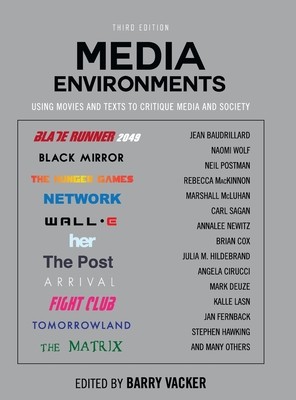
- We will send in 10–14 business days.
- Publisher: Cognella Academic Publishing
- ISBN-10: 1516574680
- ISBN-13: 9781516574681
- Format: 21.6 x 27.9 x 2.1 cm, hardcover
- Language: English
- SAVE -10% with code: EXTRA
Media Environments (e-book) (used book) | bookbook.eu
Reviews
Description
Media Environments: Using Movies and Texts to Critique Media and Society uses film as a gateway to critical readings, encouraging students to think creatively and critically about media, society, technology, and popular culture.
Rather than examine the media as separate industries or technologies, Media Environments explores media in their totality and provides models and theories for interrogating many universal themes that span media, technology, and global culture. Using popular films about media as lead-ins, students are introduced to the works of well-known thinkers and writers such as Marshall McLuhan, Jean Baudrillard, Naomi Wolf, Neil Postman, Rebecca MacKinnon, Douglas Kellner, and many others. Chapter topics span networks, spectacle, hyperreality, news, science, capitalism, and social and mobile media. The celebrity system, surveillance, internet freedom, and media futures are also discussed.
The third edition features new chapters on the global village, social and mobile media, and climate change and science in the media. Content throughout has been updated and condensed to improve the reading experience for students and increase the overall functionality of the text within higher education courses.
The wide range of films, topics, and readings permits professors to tailor the models and theories to fit their interests and expertise in teaching media and society or other media-related courses. Intellectually rigorous and thematically diverse, Media Environments is ideal for departments thinking about adopting a single text for their media studies courses. This anthology makes media criticism exciting, engaging, and enlightening.
Barry Vacker teaches media and cultural studies at Temple University in Philadelphia, where he is an associate professor in the Klein College of Media and Communication. Professor Vacker has taught media studies courses for over 20 years and authored many articles and books on art, media, culture, and technology. His newest works include: Black Mirror and Critical Media Theory (2018), an anthology co-edited with Angela Cirucci; Media(S)cene (2019), an ongoing art and media theory project co-developed with Julia Hildebrand; and Specter of the Monolith (2017), a critique of space exploration inspired by the classic 2001: A Space Odyssey. Professor Vacker earned his Ph.D. from The University of Texas at Austin.
EXTRA 10 % discount with code: EXTRA
The promotion ends in 13d.16:09:20
The discount code is valid when purchasing from 10 €. Discounts do not stack.
- Publisher: Cognella Academic Publishing
- ISBN-10: 1516574680
- ISBN-13: 9781516574681
- Format: 21.6 x 27.9 x 2.1 cm, hardcover
- Language: English English
Media Environments: Using Movies and Texts to Critique Media and Society uses film as a gateway to critical readings, encouraging students to think creatively and critically about media, society, technology, and popular culture.
Rather than examine the media as separate industries or technologies, Media Environments explores media in their totality and provides models and theories for interrogating many universal themes that span media, technology, and global culture. Using popular films about media as lead-ins, students are introduced to the works of well-known thinkers and writers such as Marshall McLuhan, Jean Baudrillard, Naomi Wolf, Neil Postman, Rebecca MacKinnon, Douglas Kellner, and many others. Chapter topics span networks, spectacle, hyperreality, news, science, capitalism, and social and mobile media. The celebrity system, surveillance, internet freedom, and media futures are also discussed.
The third edition features new chapters on the global village, social and mobile media, and climate change and science in the media. Content throughout has been updated and condensed to improve the reading experience for students and increase the overall functionality of the text within higher education courses.
The wide range of films, topics, and readings permits professors to tailor the models and theories to fit their interests and expertise in teaching media and society or other media-related courses. Intellectually rigorous and thematically diverse, Media Environments is ideal for departments thinking about adopting a single text for their media studies courses. This anthology makes media criticism exciting, engaging, and enlightening.
Barry Vacker teaches media and cultural studies at Temple University in Philadelphia, where he is an associate professor in the Klein College of Media and Communication. Professor Vacker has taught media studies courses for over 20 years and authored many articles and books on art, media, culture, and technology. His newest works include: Black Mirror and Critical Media Theory (2018), an anthology co-edited with Angela Cirucci; Media(S)cene (2019), an ongoing art and media theory project co-developed with Julia Hildebrand; and Specter of the Monolith (2017), a critique of space exploration inspired by the classic 2001: A Space Odyssey. Professor Vacker earned his Ph.D. from The University of Texas at Austin.


Reviews